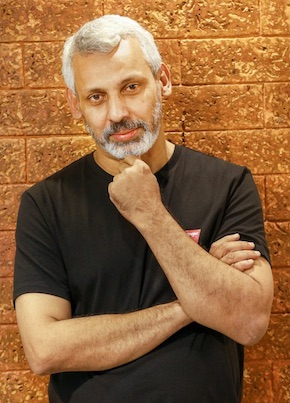Paradise Lodge
by Anees SalimAs they would go to a holy city to die, people came to Paradise Lodge to end their lives. Young and old. Men and women. Able-bodied and ailing. Like migratory birds, they arrived from places Latif had never heard of. It was as if it was the closest point to the after world, as close to heaven as the weatherworn jetty that stood to the back of the lodge, across a narrow, slimy canal.
From the top of the highway, Latif had his first glimpse of the lodge; a tallish building that had not seen a lick of paint in years, and wore a sombre brown, akin to the sepia of holy cities. The huge bay window on the fifth floor had a few missing panes and looked like a gaping mouth with the front teeth knocked out. As he walked nervously down the highway, Latif thought the lodge had the appearance of a demented old man, smiling blankly at a younger clump of architecture.
Over time, Latif had started to suspect that people checked into the rundown, short-staffed lodge only to die. Some survived, changing their minds at the last moment, probably daunted by fear or guilt, or even by the advertisement for an upcoming lottery that drifted in through an open window. Some simply succumbed. A fat ledger, made fatter by the dog-eared pages, sat on the counter in the lobby, a pen suspended from a twine glued to its spine. Latif would kill time turning its yellowing leaves, reading the entries as solemnly as one read headstones. His eyes would linger over the names against which the checkout details were not recorded. Blurry red lines ran vertically across the pages, creating columns, and under the one titled Purpose of Visit, guests wrote either Business or Personal, never To Die. Tracing the dead guests’ handwriting, usually a shaky scrawl or, occasionally, a surprising copperplate, he often wondered how they had bid farewell to their families before leaving home for the last time, and if their hands had shaken when they wrote in the ledger.
When the people on his island asked after his job in the town Latif pretended to love it, but he secretly thought of the lodge as a house of death and decay. His first day at work had left him shattered, opinionated. He had carried a freshly laundered bedsheet down a gloomy corridor to Room No. 117 and spent a long time knocking on the door. He then reported the unresponsive guest to the manager who clicked his tongue and collected a bunch of keys from the drawer. The manager was a stout middle-aged man who never ceased to remind Latif of a savage-looking Mexican footballer he had seen on a neighbour’s TV. As they walked down the corridor, he wondered if he should tell the manager that he had a doppelganger in Mexico, who played on pitches that looked like pastel green carpets. But it was his first day at work and he did not know if the manager liked football enough to be flattered by such a comparison. And the manager had the angry eyes of one who did not welcome conversations, so he decided to follow him in silence, imagining them to be two tough wardens proceeding to an even tougher inmate’s cell, the keys jingling in sync with his superior’s laboured gait.
The manager hammered on the door for a few minutes, then chose a key from the bunch and slipped it into the hole. Latif didn’t expect the door to open, but it did, and he hid himself behind the manager, anticipating something bad, and then gathered enough courage to peek into the dingy little room. The guest hung from the ceiling, his face flushed with an almost comical look, suggesting there was no dark side to death, that death was just another laughing matter. Latif immediately wanted to walk away from the lodge, never to return. But the thought of his dead father’s photograph on the living room wall, of the lunch his mother had packed for him, and the library-like silence of his insular village held him there.
Latif, new to the job and even newer to the scenario of a suicide, watched uncertainly as the manager extracted a few currencies from the wallet and pushed them into his shirt pocket.”

A bonnet macaque eating the flowers of a gulmohar tree. ‘Praveenp’/Wikimedia Commons
The manager strode into the room, skirting the pool of urine that had collected on the floor beneath the dead man, and opened the cupboard in the corner. Latif remained in the corridor and looked past the hanging guest at a window that framed the branches of a gulmohar tree – full of flowers, full of birds, full of life. The manager picked up a folded sheet of paper from the middle rack and read it cursorily. Then he put it back and anchored it with a ballpoint pen. Next, he picked up a wallet and opened it. Latif, new to the job and even newer to the scenario of a suicide, watched uncertainly as the manager extracted a few currencies from the wallet and pushed them into his shirt pocket. He turned his head away and glanced towards the jetty and watched the afternoon boat pull away. Had he caught it, he would have been home in less than an hour, lying on the narrow bed in his bare little room that afforded a distant view of the olive waterbody through a coconut grove. The next boat was due in an hour, and he knew he would not take it either. No, he would catch the one that departed just before daybreak and take the early morning boat back to work a day later, every second day. That was the arrangement with the lodge. However much he wanted to quit, his father’s photograph on the wall and the lunch his mother cooked for him in the small hours would keep him tethered to the lodge.
The manager locked the room and walked back to the lobby, and Latif trailed him nervously. Barely into the third hour of his first job, he had already witnessed a dead man being looted. Abruptly, he felt grown-up. An eyewitness to oddities. A keeper of secrets. Until a month ago, his mother had worked in a small factory that sat at the edge of the island, next to the pier, shelling cashews. She smelt of woodsmoke and cashew apples, even after she left the job. Handling smouldering cashew shells all day had left her fingers spongy, their skin scarred and smelly, rough-like sandpaper. When she could no longer hold the club that cracked cashews open, she left the job reluctantly. It was from the owner of Quilon Cashews that she heard about the vacancy at the lodge. More than the money it brought, what appealed to her about the job was the small chance of Latif getting lost in the mainland. A boat ride to the town, a leap over the canal, and he was at work. A boat ride to the island, a ten-minute walk from the pier, and he was home. If the boat capsized, he could swim either to his workplace or home, depending on where the vessel sank. He was a good swimmer. Everyone on the island was.
The manager dropped the keys into the drawer, smoked a cigarette and only then did he pick up the phone to report Room No. 117 to the authorities. Latif expected the police to arrive as soon as the phone was dropped to the cradle, the sirens of the police jeep and the ambulance overlapping onto one another. The police took hours to come. The ambulance would not arrive till late afternoon. The drive under the gulmohar was a red carpet by then, speckled with the yellow of anthers, and the police jeep came to a halt just short of the floral setting.
‘The guest is not responding,’ the manager told the police.
‘Didn’t you try to open the door?’ a policeman asked.
‘No, we were waiting for you to come.’
Latif followed the policemen and the manager down the corridor, careful not to tread on the shadows of the capped heads. He no longer thought of himself as a jail warden and the dead man as a feral inmate. He was numb in a way he had never been, not even when he heard of his father’s death, he found himself completely empty of thoughts, grief and imagination. The manager chose the wrong key from the bunch and tried to open the door. He chose three more wrong keys before using the right one. When the door fell open the manager recoiled theatrically, his mouth half open in feigned shock. Latif remembered the Mexican footballer being tripped to the ground and rolling on the pitch in fake pain, soliciting a penalty kick. A new detail caught his eye; the front of the dead man’s trousers was wet, and his big toes dribbled to the floor, as slowly as a hospital drip. The room now smelt strongly of urine.
A policeman picked up the suicide note from the cupboard and read it in a patch of sunlight while his colleague dragged a chair to the window and started to write on a clipboard. He gave the dead body long, occasional glances, as if drawing inspiration from the deceased to write a story. Latif did not wait for the rest of the proceedings. Hurrying down the corridor, he grabbed the lunch his mother had cooked for him in the light of a sooty 40-watt bulb, using a spoon to save the torments that the condiments gave her permanently bruised fingers. He sat down on a bench in the lobby and opened the oily paper parcel. Then he ran out, the lunch in his hands, and made himself sick under the star fruit tree at the back of the lodge.
from The Bellboy (Holland House Books, £9.99)
 Anees Salim dropped out of school and left home at the age of 16 to become a writer. Travelling across India, he worked as a bellboy, waiter, shop assistant and ghostwriter before joining advertising. He currently works as a Creative Director with FCB India in Kochi. His previous books include Vanity Bagh (winner of The Hindu Literary Prize for Best Fiction 2013), The Blind Lady’s Descendants (winner of the Raymond Crossword Book Award for Best Fiction 2014 and the Kendra Sahitya Akademi Award 2018), The Small-Town Sea (winner of the Atta Galatta-Banaglore Literature Festival Book Prize for Best Fiction 2017), and The Odd Book of Baby Names. The Bellboy is published in paperback by Holland House Books.
Anees Salim dropped out of school and left home at the age of 16 to become a writer. Travelling across India, he worked as a bellboy, waiter, shop assistant and ghostwriter before joining advertising. He currently works as a Creative Director with FCB India in Kochi. His previous books include Vanity Bagh (winner of The Hindu Literary Prize for Best Fiction 2013), The Blind Lady’s Descendants (winner of the Raymond Crossword Book Award for Best Fiction 2014 and the Kendra Sahitya Akademi Award 2018), The Small-Town Sea (winner of the Atta Galatta-Banaglore Literature Festival Book Prize for Best Fiction 2017), and The Odd Book of Baby Names. The Bellboy is published in paperback by Holland House Books.
Read more
@SalimAnees
@HhouseBooks



